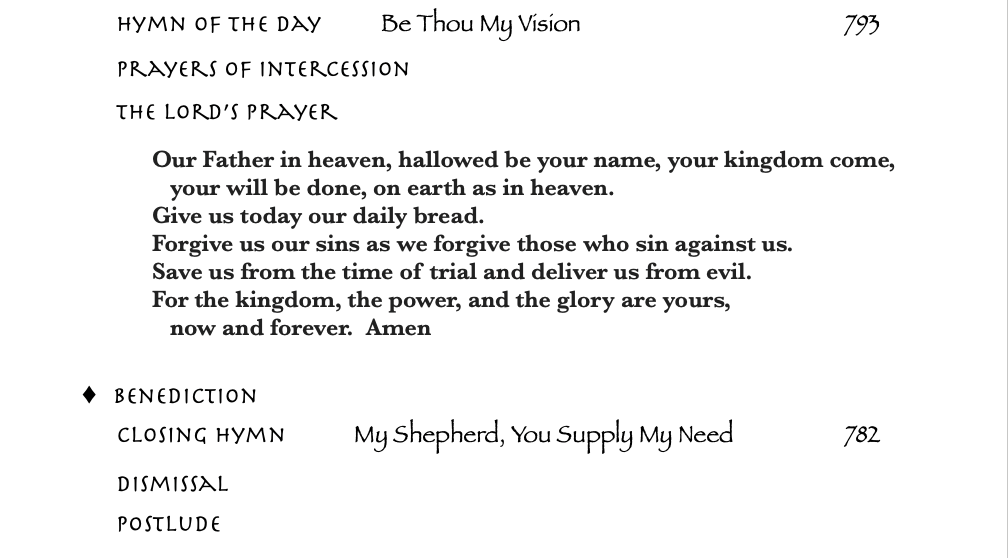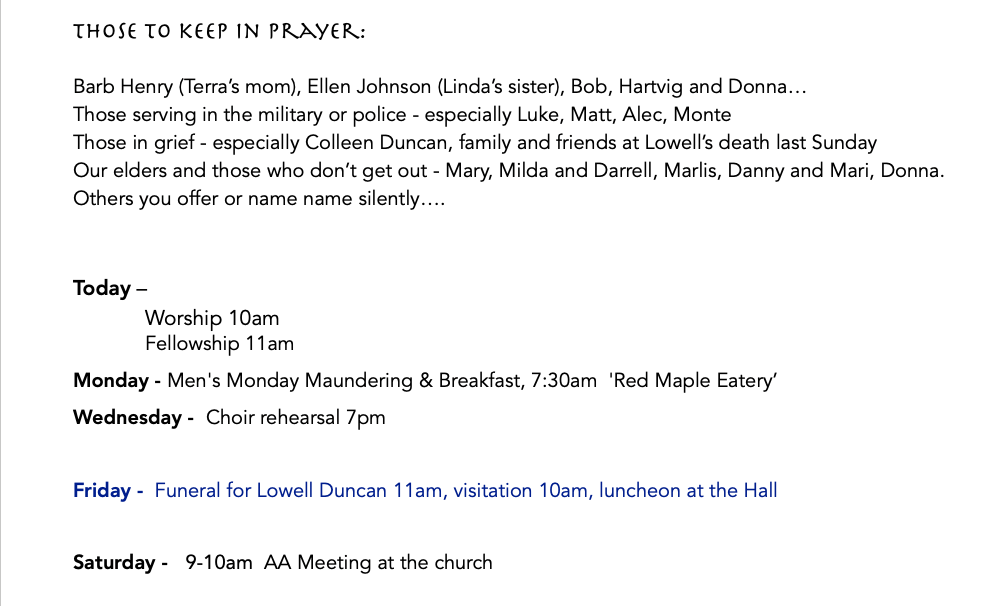Audio Recording
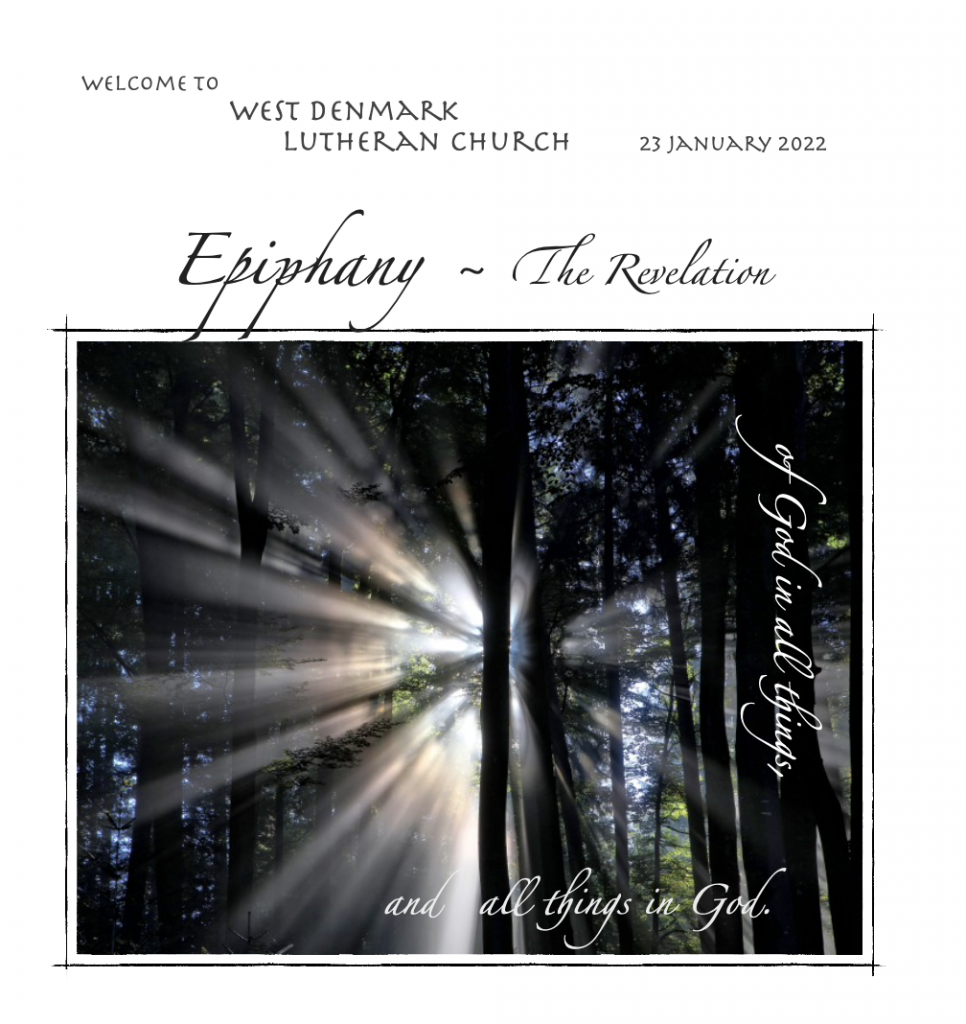
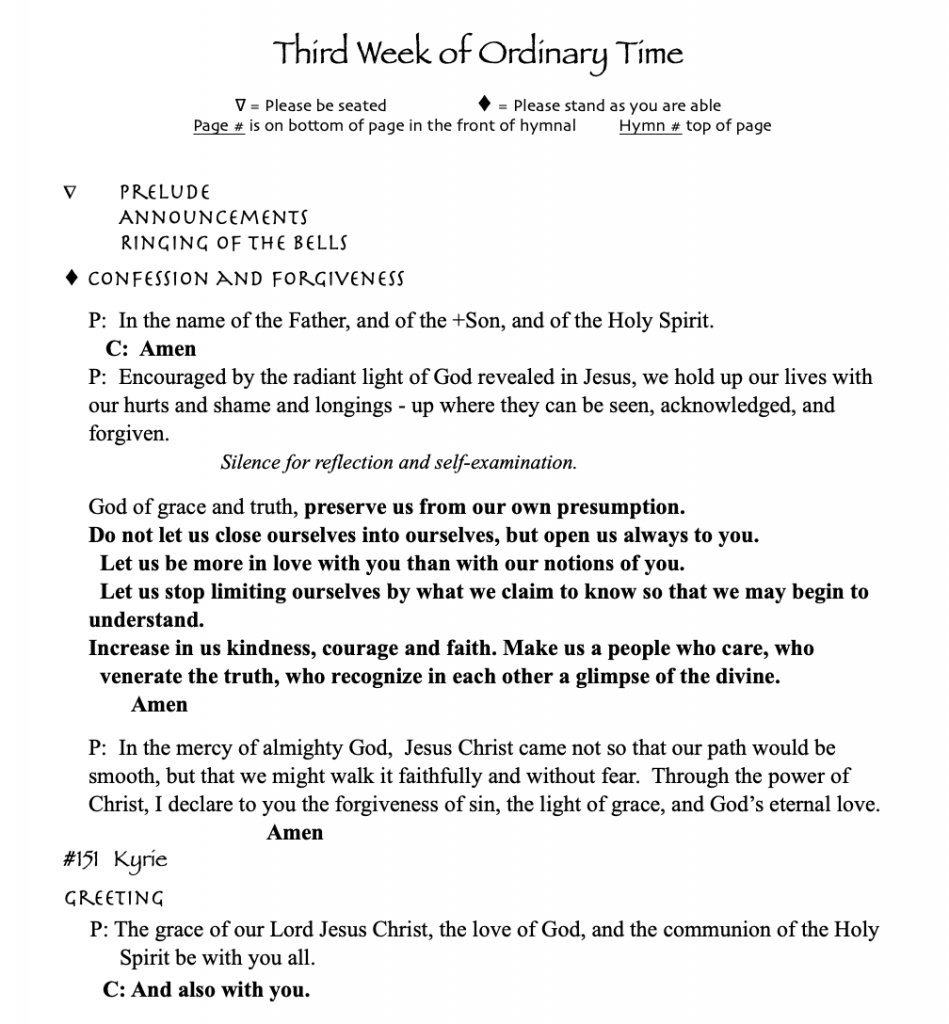
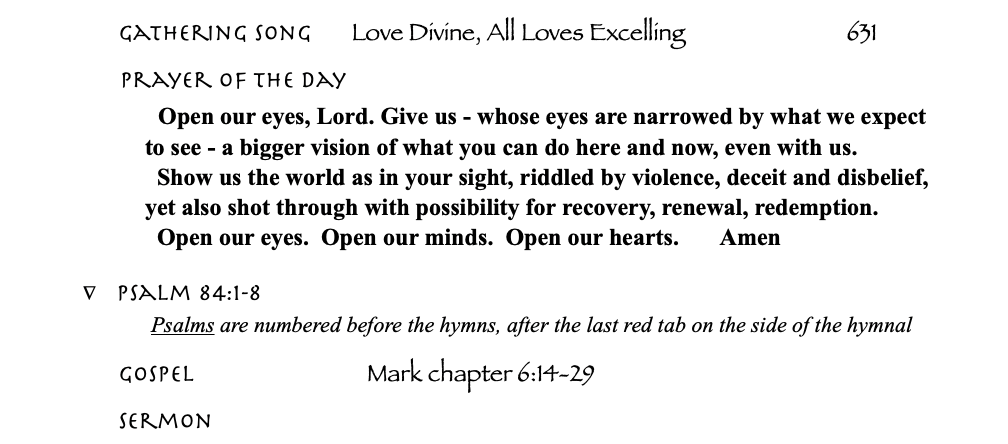
Fear and greed are two of the three great forces in the world, according to Einstein – the third is stupidity. “Power corrupts; absolute power corrupts absolutely.” Lord Acton coined the phrase in1857, but he didn’t invent the idea. As power increases, moral strength seems to diminish.
“You can only save face for so long before you wake up and realize you have nothing left worth saving,” writes novelist Catherine Ryan Hyde. These are pretty good descriptions of Herod’s birthday party. And they sound a bit too current for comfort, right?
Herod Antipas: tetrarch of Galilee and Perea, was answerable to Emperor Tiberius. His political favor rests in his ability to keep the Jews peaceful. Most historians remember him as ineffectual, weak, and cruel. This Herod is the son of the Herod the Great who ordered the killing of all male babies under the age of two after the Magi’s visit to Bethlehem. Like his father, Antipas is a coward, but he has a lot of power – and that’s a bad combination. Herod married his brother’s wife, which was illegal and considered immoral, a point John the Baptist doesn’t mind proclaiming. This did not please Herodias. Herod seemed to be drawn to John, even though listening to him was troubling, perplexing. He recognized John as righteous and holy, and tried to keep him in protective custody, perhaps out of fear more than valor. But, nursing her grudge, Herodias wanted John dead not detained. Her opportunity (literally, “a happy day”) came at a state dinner, during which her daughter danced and pleased Herod and his guests – greatly. Caught up in the moment, Herod promised her whatever she wished. After consulting her mother, young Herodias sprang the trap: “I want John’s head on a platter!” The town’s elite and powerful were in attendance; image is everything. Herod is stuck. Birthday became death day: John’s head was delivered by a ghoulish bucket brigade.
But why does Mark tell this story? It interrupts the flow of Jesus’ healing and travel narrative, Jesus isn’t a character in the story, it’s quite long, and it’s a flashback. It’s a strange story about John in which he himself never appears.
It’s told because, in good storyteller fashion, the flashback functions as a flash-forward. Mark tips us off in the confusion over Jesus’ mighty works. Herod fears that Jesus is John back from the dead. It’s all about echoes and mirrors. John and Jesus; Herod and Pilate. Like Herod Antipas, Pilate will be amazed by circumstances surrounding an innocent prisoner, swept up in events that spin out of his control, and unable to back down after being publicly outmaneuvered.
Like John, Jesus is passive in his final hours, faces his moment of truth – the opportune moment for his betrayer, and is executed by capital punishment meant to cause scandal.
Greed and fear whisper everywhere: in Herod’s ear, among Galilee’s high and mighty, behind the curtain with mother and daughter, in a dungeon prison.
When repentance is preached to this world’s princes, when brought to a moment of crisis, this is the way of the world. We cannot expect the powerful to relinquish their power, however conflicted they may be.
In the gospel, evil is not only found in the demonic or unclean spirits. It’s also in the centers of power. The real struggle here is between truth and power. And while the characters in the story are of long ago, they ask us to stare into a world of corruption, lust, and power that is not as distant as we would like it to be; and the story demands that we ask ourselves how our actions contribute to such a world – and how our actions may help the power of goodness in such a world.
This is a story about more than just bad morals; it’s a story about how things can go terribly wrong when we put our need to be in control, or our need to preserve our own privilege or power ahead of God’s desires, and God’s ways. And if we are willing to look deeply into the story, we’ll see that it sheds light on the darkest reality of who we have the potential to be and what we have the potential to do. It’s not hard to see how this story applies to the contemporary world and our country. Because if we don’t challenge the Herods of our time, we tacitly endorse what is going on.
As the saying goes, “All that is required for evil to triumph is for good people to do nothing.”
In his defense, Herod was trying to negotiate a number of complicated relationships within his household and society, and he discovered it’s hard to please everyone around him and still uphold his own personal standards. He was at odds with his wife over John the Baptist and at odds with John the Baptist over his wife. He was eager to please his constituents and trapped by his daughter’s demand for John’s execution. He feared John while also admiring him from afar. He was conscious of how society can shape your life and expectations, but he seemed to see in John a voice of truth.
These are not fictional dilemmas. We, too, may need to negotiate similarly complicated relationships. A teenager goes along with the lie so he or she can remain popular; an employee witnesses another employee do something wrong, but he doesn’t speak up because he doesn’t want to be a snitch. A parent allows a child to throw a temper tantrum time and time again because it’s easier than saying “No.” It’s in our nature to care what others think and to want to please those around us by minimizing conflicts. We don’t need be Herod to understand Herod.
When he gets word of Jesus’ ability to heal and cast out demons, Herod thinks John has come back from the dead to haunt him. It’s not John, of course, and Herod realizes that in due time. But Jesus, like John, will face execution at the hands of a ruler who cares more about pleasing his constituents than he does in exercising justice. Both Herod and Pilate act against their better judgment and condemn innocent men. John is described as the one who “goes before,” in contrast to the disciples who “come after”. Mark’s narrative reflects Jesus in John. This role of preceding the “one to come” continues into the story of Jesus’ death, reflected in the language – “they came and took his body and laid it in a tomb”. The death of John alerts us to the future unfolding before Jesus.
Flannery O Connor once said: “There is a moment in every story in which the presence of grace can be felt as it waits to be accepted or rejected even though the reader may not recognize this moment.” Herod’s banquet is one of those moments – seen through a mirror dimly. It’s the first of two meals in this chapter. Jesus hosts the second, in the middle of nowhere for thousands of nobodies with nothing to offer save five loaves and two fish. At that feast greed and fear have no place. At that meal all are fed, with leftovers beyond comprehension.
Wickedness seems to flourish, but goodness has the final word – more importantly to us, not only is goodness the final word, but the word we want to hear, need to hear – and a word we need to share.
It is God’s grace – not our will, not our belief, not even our openness to God’s will that powers goodness – because, as God knows and Mark keeps showing us, we are all flawed and broken and blind to the things that really matter. We catch a glimpse here and there. Epiphanies. We see things that are ‘kinda like’ the kingdom of God that remind us of the love of an almighty God, things that compel us, convict us, and inspire us to clearer vision and broader horizons. It might not sound much like good news, but on days when you feel like a muddled failure and not a pillar of spiritual fervor, we can be really grateful that scripture is full of muddled characters… even the good ones don’t get it, and they – like we – rely body and soul on the grace of a loving, merciful, powerful God… and they – like we – are not disappointed. Thanks be to the God of Love.
